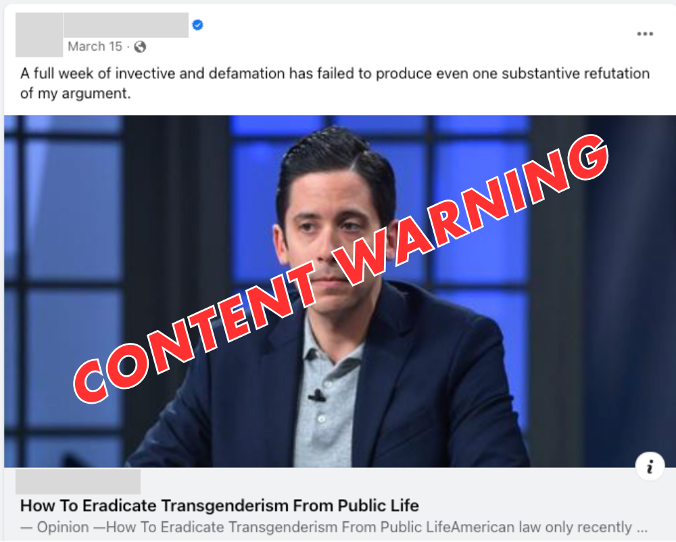Online Anti-LGBTQ Hate Terms Defined: “Transgenderism”
This entry is part of the GLAAD Guide to Anti-LGBTQ Online Hate and Disinformation, an ongoing project to identify some of the most prevalent and egregious terms, tropes, and concepts that are used to harass, attack, and spread malicious misinformation about LGBTQ people on social media. Learn more here.
*CONTENT WARNING*
The example below includes a hateful term, phrases and imagery.
“Transgenderism”

The current, popularized usage of the term “transgenderism” arises from anti-trans extremists who seek to delegitimize and dehumanize transgender people by falsely implying that being transgender is an ideology rather than an identity. (See here for a longer history of the term’s usage.)
In her March 2023 essay, “On the Right’s Call to “Eradicate Transgenderism” (It Means Exactly What You Think It Means)” journalist Parker Molloy further explains: “words like ‘transgenderism’ and ‘gender ideology’ are almost exclusively used by anti-trans activists to obscure the fact that trans people are simply people who just happen to be trans. It’s not a belief system.”
For example, the term “transgenderism” was notably weaponized in a speech by far-right commentator Michael Knowles at the 2023 Conservative Political Action Conference (CPAC), where he pronounced: “For the good of society … transgenderism must be eradicated from public life entirely.” Knowles posted versions of the speech on YouTube, as well as variations of the same rhetoric on his other social media accounts, while disingenuously asserting that his call for violence was not violent.
On social media, Knowles and other far-right media figures employ the term (along with other variations of the trope such as “gender ideology”) to disingenuously evade platforms’ hate speech and harassment policies — which prohibit speech targeting people with hate on the basis of protected characteristics such as gender identity (while speech targeting ideologies is allowed). Anti-trans figures and groups continue to promote the term online and offline as a dog whistle expressing contempt and hatred of transgender people.
Explore more via GLAAD’s Guide to Anti-LGBTQ Online Hate and Disinformation.
Conclusion
This is just one example of anti-LGBTQ online hate and disinformation. Every term and concept should be evaluated in context. For instance, LGBTQ people and allies may use hashtags with hate terms as counterspeech, or slurs such as “tranny” or “dyke” may be used self-referentially to reclaim them. This guide will be updated on an ongoing basis. Please see the latest GLAAD Social Media Safety Index report for a deeper exploration of the current social media landscape for LGBTQ people, including GLAAD’s recommendations and thought leadership in the field.
How to Report Anti-LGBTQ Online Hate Speech and Harassment
Every major social media platform has policies which prohibit hate and harassment on the basis of protected characteristics, including sexual orientation and gender identity. To learn how to report potentially violative content, check out GLAAD’s LGBTQ Digital Safety Guide, which includes basic tips on helping our community be more safe online.
About the GLAAD Social Media Safety Program
As the leading national LGBTQ media advocacy organization, GLAAD is working every day to hold social media platforms, tech, and AI companies accountable, and to secure safer online spaces for LGBTQ people. The GLAAD Social Media Safety Program produces the highly-respected annual Social Media Safety Index (SMSI) and researches, monitors, and reports on a variety of issues facing LGBTQ social media users — with a focus on safety, privacy, and expression.












